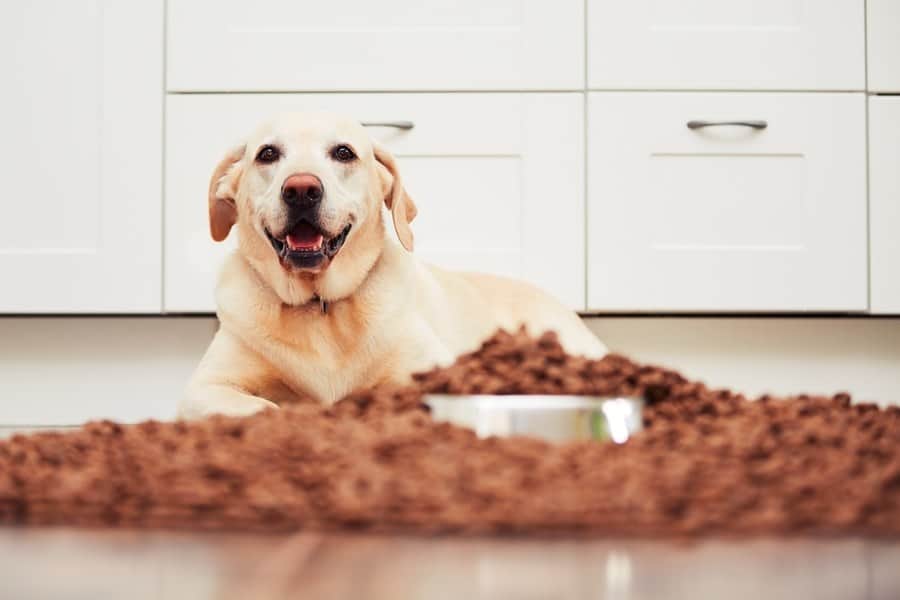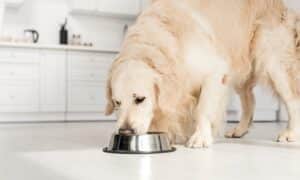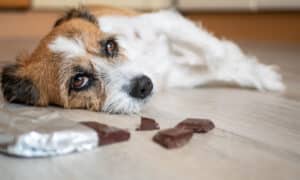“This post contains affiliate links, and I will be compensated if you make a purchase after clicking on my links.”

Feeding your dog is one of the most basic principles of being a dog owner, but there are so many factors to consider. To make things easier on pet parents everywhere, I’m sharing my expert answers to four of the most commonly searched questions about dogs and what they eat.
1. What is the best dog food?

One of the most common questions veterinarians are asked is, “What is the best dog food?” If I had a dollar for every time I’ve been asked this question over the past 30+ years, I could probably retire (not that I would ever even consider that, of course). And, the funny thing is, there is NO right answer.
There are many factors to be considered when deciding what to feed your dog, but here are a few that I feel are important:
- Food quality and taste: You want a food that will give your dog a nice, shiny coat, energy and healthy digestion.
- Cost, storage and convenience: Will you primarily purchase the food at a pet store or at the supermarket?
- Nutritional needs based on your dog’s health status or life stage: Does your dog have allergies? Has your veterinarian recommended any sort of prescriptive diet? Dogs also have different nutritional needs depending on their breed size.
As far as quality, to start, make sure the food meets, or exceeds, the standards set forth by the Association of American Feed Control Officials (AAFCO). All name brand foods should have the AAFCO certification. From there, look at the ingredient panel on foods you’re considering and keep an eye out for real proteins, beet pulp and other natural fiber sources for digestion and antioxidants for immunity.
One last thing — when switching food make sure to do it gradually over time to avoid intestinal problems. When you choose to go with a high quality food, you should see visible differences in your dog – energy, coat quality, digestion health – after you’ve switched.
One of the brands I often recommend is IAMS (my dogs eat this as well, and love it) because it’s made with high-quality protein from real chicken and egg, whereas other brands may use a lower quality protein like soy. It’s also a “premium” brand, but it is available at the supermarket and online, which makes it very convenient.
2. How much should I feed my dog?

There are many considerations here. Most dog foods have feeding recommendations on the bag, which provide a good starting point for knowing how much to feed your dog. However, a dog’s caloric needs are based on age, development, health and lifestyle, and every dog has a “resting energy requirement,” (RER) which is basically the amount of calories their bodies require to just maintain bodily functions. You should consult your dog’s veterinarian, as he/she can best advise you on the proper RER for your pet.
By feeding your dog the correct amount of food based on their needs, you’ll help provide them with the nutrition they need to look, feel, and play young throughout life! To that end, another reason that I often recommend IAMS or brand dog food to my patients is because it’s made with high quality ingredients that aid in healthy activity, including fats from farm-raised chickens and beef to help provide long-term energy and wholesome grains for healthy short-term energy.
3. Why does my dog eat poop and grass?

Here it is — the $64,000 question. The answer? Who knows?? Over the years I’ve heard countless reasons, yet all conjecture. Nothing has ever been scientifically proven. All pretty much agree that it is not because of some nutritional deficiency — we think it’s more behavioral. Here are a few common theories:
- With puppies, we think they look at stool as something to play with, so we encourage owners to clean up after their puppies and to give them enough real toys to play with instead.
- Females seem to eat their own stools, I believe that’s because in the wild, a female dog and her pups were at risk because of predators, so the mother would clean up after herself and pups to remove any scent that would attract a predator.
- Males, on the other hand, continually wanted to “claim” their territory, and would therefore remove the scent of other animals by eating the other animals’ stool, and leave their own behind.
- Another reason could be that if dogs have been reprimanded in the past for defecating where they aren’t supposed to, they may be eating it to remove the evidence.
4. What should I do if my dog eats something harmful?

There are two phone numbers you should always have readily available — your veterinarian’s and a Pet Poison Hotline. There are many items that are even more harmful than most even know about (like the artificial sweetener Xylitol found in many sugarless peanut butters, mints and gums), and others where the dangers are purely dose dependent (like chocolate, certain nuts, raw onions and garlic, avocados and many flowers, such as poinsettias).
When calling your veterinarian or a poison control hotline, have the packaging with you, know the weight of your dog and about how much of the item was ingested. This will help them determine what treatment might be necessary.
The ASPCA and Pet Poison Helpline websites have great tips on foods, plants and other items that can be harmful to your pets, as well as tips on what to do if your pet does get into something they shouldn’t.
– Jeff Werber, D.V.M.

Practicing veterinarian and established veterinary medical journalist, Dr. Jeff Werber, known to the world and his patients as “Doc Hollywood,” is frequently seen on the nation’s top news and talk shows educating and enlightening pet parents on everything from basic pet care and nutrition to abnormal behavior and prevention of disease. An Emmy-Award winner, Dr. Jeff works hard at his mission to strengthen the “Human-Companion Animal Bond.”
Many people would also remember him from his days hosting Petcetera on Animal Planetand Lassie’s Pet Vet on PBS. Dubbed a “Celebrity Vet” by The Hollywood Reporter, he also cares for furry friends of Hollywood’s biggest stars. President and Chief Veterinarian of the Century Veterinary Group in Los Angeles, Dr. Jeff has practiced veterinary medicine for more than 30 years and is one of a select few actively-practicing veterinary medical journalists in the United States. He serves on the advisory board of Veterinary Economics Magazine. Dr. Werber is a spokesperson for IAMS.
























Charlotte Lalime
says:Iams is a horrible food. My pup thrives on a raw diet and it was the only diet that worked as he had horrible bouts of diarrhea with everything I tried…raw was my last option and it worked.
Linda
says:I agree with Deb! I have bred and shown dogs more than 40 years and have found vets to be less than knowledgeable regarding nutrition. My dogs are fed a raw diet, but recommend Orijen as a good kibble alternative.
Albert W Platt
says:No, not on crack, and, yes, well-versed in pet nutrition, Dr. Werber is sharing valid info on what/how to feed pets.
There is nothing in the list of ingredients referred to by Deb D that is a problem; all are essential elements of a balanced diet. In fact, far from simply being “additives,” most of these ingredients are simply isolated and verified elements already found in”natural” diets, but which according to law must be verified and listed individually.
Unless fed as whole prey animals (hide, hair, brains, bones, abdominal organs and all) there are NO “natural’ or Raw diets which contain all of the micronutrients that are needed by our companion animals. Even then, raw diets of any form can contain pathogens and parasites which threaten both our pets and our human family members.
Though I certainly share the desire to provide quality nutrition to our pets, and understand the popular appeal of a more “natural” diet, the reality is that modern commercial pet nutrition (along with parasite control and immunizations and preventing our pets from wandering) has been a big part of helping our pets live longer and better lives than ever before. I am not on the payroll of any pet food company; I am a licensed veterinarian with almost 40 years of experience in practice. I have become very tired and very wary of the individuals, websites, and companies which claim to “care” more about pets than those of us who have dedicated our lives to enhancing the relationships between pets and people.
Jeff is correct: choose a nationally-known pet food company (adequate resources for proper R + D and proper quality control) which is AAFCO-certified, which is consistent with your personal general nutritional philosophy, and which satisfies your pet and his/her GI tract.
Deb D
says:Are you on crack? What kind of self-respecting vet would recommend Iams, let alone feed it to your own dogs? Might I suggest a refresher course in pet nutrition? My guess is you could afford to do so with the fees that you collect from Mars Petcare in exchange for you promoting their food. In case you haven’t taken a look at their ingredients lately, here they are: Chicken By-Product Meal (source of Chondroitin Sulfate and Glucosamine), Corn Meal, Ground Whole Grain Sorghum, Ground Whole Grain Barley, Fish Meal (source of fish oil), Chicken, Dried Beet Pulp, Chicken Flavor, Chicken Fat (preserved with mixed Tocopherols, a source of Vitamin E), Dried Egg Product, Potassium Chloride, Brewers Dried Yeast, Salt, Sodium Hexametaphosphate, Fructooligosaccharides, Fish Oil (preserved with mixed Tocopherols, a source of Vitamin E), Calcium Carbonate, Flax Meal, Choline Chloride, Minerals (Ferrous Sulfate, Zinc Oxide, Manganese Sulfate, Copper Sulfate, Manganous Oxide, Potassium Iodide), Vitamin E Supplement, Dried Chicken Cartilage (source of Chondroitin Sulfate and Glucosamine), DL-Methionine, Vitamins (Ascorbic Acid, Vitamin A Acetate, Calcium Pantothenate, Biotin, Thiamine Mononitrate (source of vitamin B1), Vitamin B12 Supplement, Niacin, Riboflavin Supplement (source of vitamin B2), Inositol, Pyridoxine Hydrochloride (source of vitamin B6), Vitamin D3 Supplement, Folic Acid), Beta-Carotene, L-Carnitine, Citric Acid, Rosemary Extract.